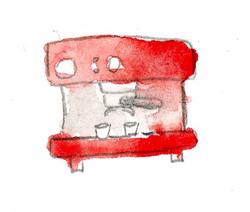RIP #RaceTogether And Also Maybe How To Salvage It If Anyone Wants

Let’s observe a moment of silence for Starbucks’s misconceived, misguided, but thought-provoking contribution to racial discourse in America. #RaceTogether lasted all of about seven days, through which it was heckled, mocked, critiqued, occasionally defended, and generally seen as one more example of American commerce being clueless. It was, you could say, ThinkPieced to death. It suffered death by a thousand tweets.
Anyway, it’s over.
Starbucks baristas will no longer write “Race Together” on your cup of latte.
The handwritten notes were part of the coffee chain’s much-maligned initiative to start tough conversations by having your coffee cup be the catalyst for complicated questions about race.
According to the Associated Press, the company’s chairman Jim Olson claims the phasing out of the handwritten notes was part of the plan since the beginning of “Race Together.” He also asserted that the changes are not a response to public mockery and outrage over the concept.
In other “it only lasted a week” corporate news, UN Women will not be partnering with Uber after all:
Uber’s partnership with UN Women lasted little more than a week.
Eight days after Uber allied with UN Women and made a bold promise to create 1 million jobs for women on its ride-hailing platform by 2020, the gender equality organization has abandoned the initiative, BuzzFeed News has confirmed.
Responding to public outcry over Uber’s safety track record with female passengers and drivers, UN Women Executive Director Phumzile Mlambo-Ngcuka canceled the organization’s partnership with the company.
“I want to assure you that not only are we listening, we are aligned,” Miambo-Ngcuka said in a speech. “And I also want to assure you that UN Women will not accept the offer to collaborate on job creation with Uber.”
Sound decision.
But I keep thinking about #RaceTogether. Did any barista ever actually carry out his or her voluntary mandate? Will any company ever attempt something like this again — trying to incorporate real dialogue into a perfunctory exchange of goods or service — and if not, is that a good thing? Is one answer perhaps that these kinds of initiatives shouldn’t be top-down, starting with well-meaning but tone-deaf white CEOs? If they happen at all, they should probably come because employees as a whole believe in them; that way, the employees themselves can defend them if the ideas are challenged. Without community buy-in, any innovation may well be doomed to failure and ridicule.
Mike and I discussed a bit.
MIKE: I didn’t think it would last.
ESTER: Yeah, it was a PR disaster. They didn’t think it through or roll it out well. Getting coffee is supposed to be an anodyne experience. That’s why they make those places so soothing.
MIKE: Brands and Race Relations is a weird weird combo. People chat over a cup of coffee. But not with brands.
ESTER: Right! The stores should offer their spaces maybe. “Come talk about race at Starbucks.” But not with the employees, and not while they’re on the clock.
MIKE: There is a burger joint in Ferguson where people gather to talk about race. But it happened organically.
ESTER: Nice. There should be spaces were dialogue can happen. #CoffeeSummits
Support The Billfold
The Billfold continues to exist thanks to support from our readers. Help us continue to do our work by making a monthly pledge on Patreon or a one-time-only contribution through PayPal.
Comments